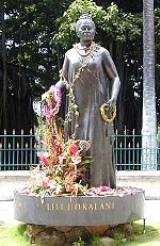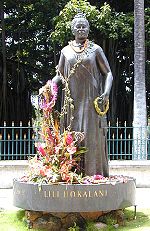
Aloha 'Oe
Encyclopedia
"Aloha ʻOe" is Liliʻuokalani's most famous song and a common cultural Leitmotif
for Hawaii
. The song was inspired by a horseback trip she took in 1877 to the windward side of Oʻahu
. After visiting the Boyd ranch in Maunawili, Liliʻuokalani witnessed a farewell embrace between Colonel James Harbottle Boyd and one of the young ranch ladies.
Musicologist Sigmund Spaeth
noted that the first two measures of the melody of the chorus (which are arpeggiated IV-I chords) resemble the chorus of George Frederick Root
's 1854 song "There's Music In The Air", but measures 3 and 4 differ from it. The chorus of the popular 1954 song "Open Up Your Heart (And Let the Sunshine In)
" also begins with the same melodic motif.
The song "The Rock Beside The Sea" referred to was published by Charles Crozat Converse in 1857, and itself derives from a Croatian folk song, "Sedi Mara Na Kamen Studencu" (Girl On The Rock). Its melodic resemblance is to the first measure of Aloha `Oe, diverging from it after that.
Leitmotif
A leitmotif , sometimes written leit-motif, is a musical term , referring to a recurring theme, associated with a particular person, place, or idea. It is closely related to the musical idea of idée fixe...
for Hawaii
Hawaii
Hawaii is the newest of the 50 U.S. states , and is the only U.S. state made up entirely of islands. It is the northernmost island group in Polynesia, occupying most of an archipelago in the central Pacific Ocean, southwest of the continental United States, southeast of Japan, and northeast of...
. The song was inspired by a horseback trip she took in 1877 to the windward side of Oʻahu
Oahu
Oahu or Oahu , known as "The Gathering Place", is the third largest of the Hawaiian Islands and most populous of the islands in the U.S. state of Hawaii. The state capital Honolulu is located on the southeast coast...
. After visiting the Boyd ranch in Maunawili, Liliʻuokalani witnessed a farewell embrace between Colonel James Harbottle Boyd and one of the young ranch ladies.
This tender farewell set Lili`uokalani to thinking, and she began humming to herself on the homeward trip. Overhearing, Charles Wilson observed, "That sounds like The Lone Rock by the Sea," a comment with which Lili`uokalani is said to have agreed. When the party paused to rest in an orange grove on the Honolulu side of the Pali, the others joined in the hummings, and the song was completed later at Washington PlaceWashington PlaceWashington Place is a Greek Revival palace in the Hawaii Capital Historic District in Honolulu, Hawaii. It was where Queen Liliuokalani was arrested during the overthrow of the Hawaiian Kingdom. Later it became the official residence of the Governor of Hawaii. It is a National Historic Landmark,...
.
| Haʻaheo ka ua i nā pali | Proudly swept the rain by the cliffs |
| Ke nihi aʻela i ka nahele | As it glided through the trees |
| E hahai (uhai) ana paha i ka liko | Still following ever the bud |
| Pua ʻāhihi lehua o uka | The ʻāhihi lehua of the vale |
| Hui: | Chorus: |
| Aloha ʻoe, aloha ʻoe | Farewell to thee, farewell to thee |
| E ke onaona noho i ka lipo | The charming one who dwells in the shaded bowers |
| One fond embrace, | One fond embrace, |
| A hoʻi aʻe au | 'Ere I depart |
| Until we meet again | Until we meet again |
| ʻO ka haliʻa aloha i hiki mai | Sweet memories come back to me |
| Ke hone aʻe nei i | Bringing fresh remembrances |
| Kuʻu manawa | Of the past |
| ʻO ʻoe nō kaʻu ipo aloha | Dearest one, yes, you are mine own |
| A loko e hana nei | From you, true love shall never depart |
| Hui | Chorus |
| Maopopo kuʻu ʻike i ka nani | I have seen and watched your loveliness |
| Nā pua rose o Maunawili | The sweet rose of Maunawili |
| I laila hiaʻia nā manu | And 'tis there the birds of love dwell |
| Mikiʻala i ka nani o ka lipo | And sip the honey from your lips |
| Hui | Chorus |
Musicologist Sigmund Spaeth
Sigmund Spaeth
Sigmund Gottfried Spaeth was a musicologist who traced the sources and origins of popular songs to their folk and classical roots...
noted that the first two measures of the melody of the chorus (which are arpeggiated IV-I chords) resemble the chorus of George Frederick Root
George Frederick Root
George Frederick Root was an American songwriter, who found particular fame during the American Civil War.-Biography:...
's 1854 song "There's Music In The Air", but measures 3 and 4 differ from it. The chorus of the popular 1954 song "Open Up Your Heart (And Let the Sunshine In)
Open up Your Heart (and Let the Sunshine in)
"Open up Your Heart " is a popular song. It was written by Stuart Hamblen. The song was published in 1954.The biggest hit version in the United States was a recording by the Cowboy Church Sunday School ; in the United Kingdom, by Joan Regan and her son Rusty...
" also begins with the same melodic motif.
The song "The Rock Beside The Sea" referred to was published by Charles Crozat Converse in 1857, and itself derives from a Croatian folk song, "Sedi Mara Na Kamen Studencu" (Girl On The Rock). Its melodic resemblance is to the first measure of Aloha `Oe, diverging from it after that.


